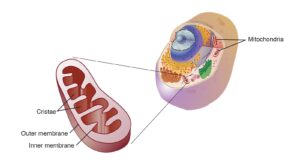Chi Kung is translated to energy work by some, but working with energy requires energy …. here plays mitochondria function a decisive role!
Therefore, let us look more at mitochondria
What is mitochondria?
Mitochondria are membrane-bound cell organelles (mitochondrion, singular) that generate most of the chemical energy needed to power the cell’s biochemical reactions. Chemical energy produced by the mitochondria is stored in a small molecule called adenosine triphosphate (ATP). Mitochondria contain their own small chromosomes. Generally, mitochondria, and therefore mitochondrial DNA, are inherited only from the mother.
The origin of mitochondria and chloroplasts _ Learn Science at Scitable
https://www.google.com/search?q=evolution+of+mitochondria+and+chloroplasts&sca_esv=8c91e03b9c26d918&ei=QixwZ62ZNpaqwPAP6_CA4Qg&oq=evoltion+of+mitochondria%3F&gs_lp=Egxnd3Mtd2l6LXNlcnAiGWV2b2x0aW9uIG9mIG1pdG9jaG9uZHJpYT8qAggAMgkQABiABBgTGA0yCRAAGIAEGBMYDTIJEAAYgAQYExgNMgkQABiABBgTGA0yCBAAGBMYDRgeMggQABgTGA0YHjIIEAAYExgNGB4yCBAAGBMYDRgeMgoQABgTGAoYDRgeMgoQABgTGAUYDRgeSOCZAVAAWLAycAB4AZABAJgBaaABygeqAQQxMC4yuAEDyAEA-AEBmAIMoALNCMICBhAAGAcYHsICBxAAGIAEGA3CAggQABgHGAoYHsICCBAAGIAEGKIEwgIFEAAY7wXCAgYQABgNGB7CAggQABgIGA0YHpgDAJIHAzkuM6AH31w&sclient=gws-wiz-serp
The Origin and Evolution of Cells
https://www.ncbi.nlm.nih.gov/books/NBK9841/
Mitochondrial Disease
What is mitochondrial disorder?
Mitochondrial disease, or mitochondrial disorder, refers to a group of disorders that affect the mitochondria, which are tiny compartments that are present in almost every cell of the body. The mitochondria’s main function is to produce energy. More mitochondria are needed to make more energy, particularly in high-energy-demand organs such as the heart, muscles, and brain. When the number or function of mitochondria in the cell is disrupted, less energy is produced, and organ dysfunction results.
Depending on which cells within the body have disrupted mitochondria, different symptoms may occur. Mitochondrial disease can cause a vast array of health concerns, including fatigue, weakness, metabolic strokes, seizures, cardiomyopathy, arrhythmias, developmental or cognitive disabilities, diabetes mellitus, impairment of hearing, vision, growth, liver, gastrointestinal, or kidney function, and more. These symptoms can present at any age from infancy up until late adulthood.
https://www.chop.edu/conditions-diseases/mitochondrial-disease
It can happen to ANYONE at ANYTIME
What are the red flag symptoms of mitochondrial disease?
Affected individuals may suffer strokes, seizures, reflux, severe vomiting, constipation, diarrhea, swallowing difficulties, blindness, deafness, heart and kidney problems, muscle failure, diabetes, lactic acidosis, immune system problems and liver disease.
https://mitocanada.org/wp-content/uploads/simple-file-list/MitoCanada_FAQs_Aug2018.pdf
Boston Chilrens Hopspital
https://www.childrenshospital.org/conditions/mitochondrial-disease
How to check mitochondrial dysfunction?
They include:
- Biochemical tests on urine, blood and spinal fluid.
- A muscle biopsy to examine the mitochondria and test enzyme levels.
- Magnetic resonance imaging (MRI) of the brain and spine.
Much more is coming

